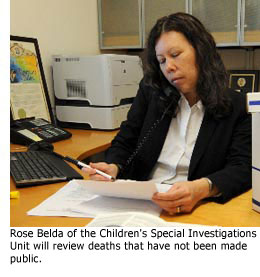New conflict over child death records
August 24, 2010
 For a second consecutive week, the Board of Supervisors tangled over the release of information on the deaths of children who’ve had a history of contact with Los Angeles county child welfare authorities.
For a second consecutive week, the Board of Supervisors tangled over the release of information on the deaths of children who’ve had a history of contact with Los Angeles county child welfare authorities.
The board unanimously approved a motion by Supervisor Gloria Molina asking for an independent analysis of what information the supervisors can—and cannot—make public about child deaths allegedly caused by abuse or neglect. That study will be undertaken by the county’s Office of Independent Review.
Molina’s motion comes one week after Supervisor Zev Yaroslavsky said during a board session that county officials seemed more concerned with plugging leaks than with fixing problems in the Department of Children and Family Services. His comments prompted strong reaction from some of his colleagues and seemed to be a subtext of Molina’s motion on Tuesday.
“All members of this Board support transparency and the County’s duty to disclose information in the public interest—particularly when such information involves the death of vulnerable children,” Molina said in the motion. But she said the board also has a legal duty to protect confidential child information and that the law provides “a clear path” for the disclosure of such data.
“The failure to support ‘leaks’ of sensitive personal and case information outside these legal processes should not be construed as a rejection of transparency,” Molina said in a veiled rebuke to her board colleague, Yaroslavsky.
Yaroslavsky, for his part, pursued a provocative new tack in questioning DCFS’ commitment to transparency. He suggested that the embattled department may intentionally be classifying some child deaths in ways that keep them secret.
Under a California law called SB 39, certain information is made public about a child’s death when it is determined to have resulted from abuse or neglect. Once that determination is made, the public can then seek more detailed information. Without a finding of abuse or neglect, the case remains untraceable.
Yaroslavsky was skeptical of the large number of deaths that DCFS determined were not caused by abuse or neglect in recent years, including the shocking suicide in June of an 11-year-old boy named Jorge T., who’d endured a history of documented physical abuse. Yaroslavsky said DCFS concluded that that death was not the result of abuse or neglect and was not subject to disclosure under SB 39.
“What I’m interested in knowing,” the supervisor said, “is how many other Jorge T.-type cases are there where arguably the death may not have come at the hands of another, but the death was clearly caused by the cumulative abuse and neglect over a period of time. And I think the department has an interest in minimizing the number of cases that they put on the SB 39 list because, frankly, it makes them look better.”
“I think somebody’s making a call on some of these cases that just doesn’t meet the smell test for me,” Yaroslavsky added.
At one point in the discussion, County Counsel Andrea Sheridan Ordin told Yaroslavsky that she believed Jorge’s case was still being investigated and that no determination had been made about whether his suicide was the result of abuse or neglect.
“You believe or you know?” Yaroslavsky asked her.
“I believe,” she responded.
Yaroslavsky’s continued line of questioning prompted this personal barb from Molina: “I know you’re interested in misinforming everyone about what the department [DCFS] is doing or not doing.”
Following the meeting, Yaroslavsky said that “a decision was made many weeks ago not to classify Jorge’s death as an SB 39 case—a determination that has not been changed as of today, more than two months after the youngster’s suicide.”
Prior to Tuesday’s session, Yaroslavsky had hoped to gain support for a motion directing the Children’s Special Investigation Unit (CSIU) to examine whether cases were wrongly excluded from SB 39 disclosure, “thereby preventing a public discussion and the development of policies that could help avert such deaths in the future.” But when it became clear that his colleagues were unwilling to pass the measure, Yaroslavsky said he used his authority to individually ask CSIU to undertake the review.
Rose Belda, who heads the unit, testified Tuesday that based on her experience, the list of SB 39 cases could be “construed in a more expansive way, if that was the desire.”
Posted 8/24/10












 405 bridge work causes a stink
405 bridge work causes a stink

